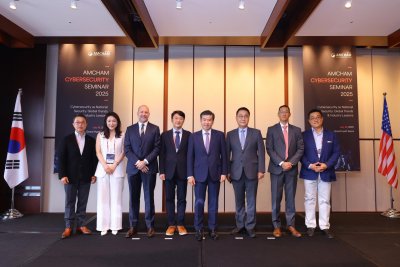The American Chamber of Commerce in Korea, which represents hundreds of companies mostly from the United States, opposes the introduction of a controversial pro-labor bill in South Korea. Photo courtesy of the American Chamber of Commerce in Korea
SEOUL, July 31 (UPI) — Organizations that represent global corporations in South Korea have raised concerns about the so-called “Yellow Envelope Law,” a pro-labor bill that the ruling Democratic Party is seeking to pass with its parliamentary majority.
The bill is intended to protect subcontracted workers, limit corporate lawsuits seeking damages from strikes and expand legal responsibility for company executives who avoid collective bargaining.
“A flexible labor environment is essential to strengthening Korea’s competitiveness as a business hub in the Asia-Pacific region,” American Chamber of Commerce in Korea Chairman and CEO James Kim said in a statement Wednesday.
“If enacted in its current form, this legislation could influence future investment decisions by American companies considering Korea,” he said..
Regulatory unpredictability remains one of the top challenges for foreign-invested companies in Korea. This legislation may add to that uncertainty and, in turn, undermine Korea’s global competitiveness.”
The warning came after the National Assembly’s Environment and Labor Committee passed the Yellow Envelope Law on Monday, which is waiting for a decision in the Democratic Party-dominated plenary session.
The bill, which was twice vetoed by former President Yoon Suk-yeol, is highly likely to move forward under incumbent President Lee Jae-myung, who has overtly supported its introduction.
Should the law be enacted, the European Chamber of Commerce in Korea indicated that it could prompt foreign companies to leave the country.
“Given the numerous criminal sanctions imposed on employers under the Trade Union Act, this vague and expanded definition may treat business operators as potential criminals and significantly discourage business activity,” the chamber commented in a statement.
“The impact is particularly severe for foreign-invested companies, which are highly sensitive to legal risks stemming from labor regulations,” it added.
The two chambers represent hundreds of corporate members from the United States and Europe, respectively.
